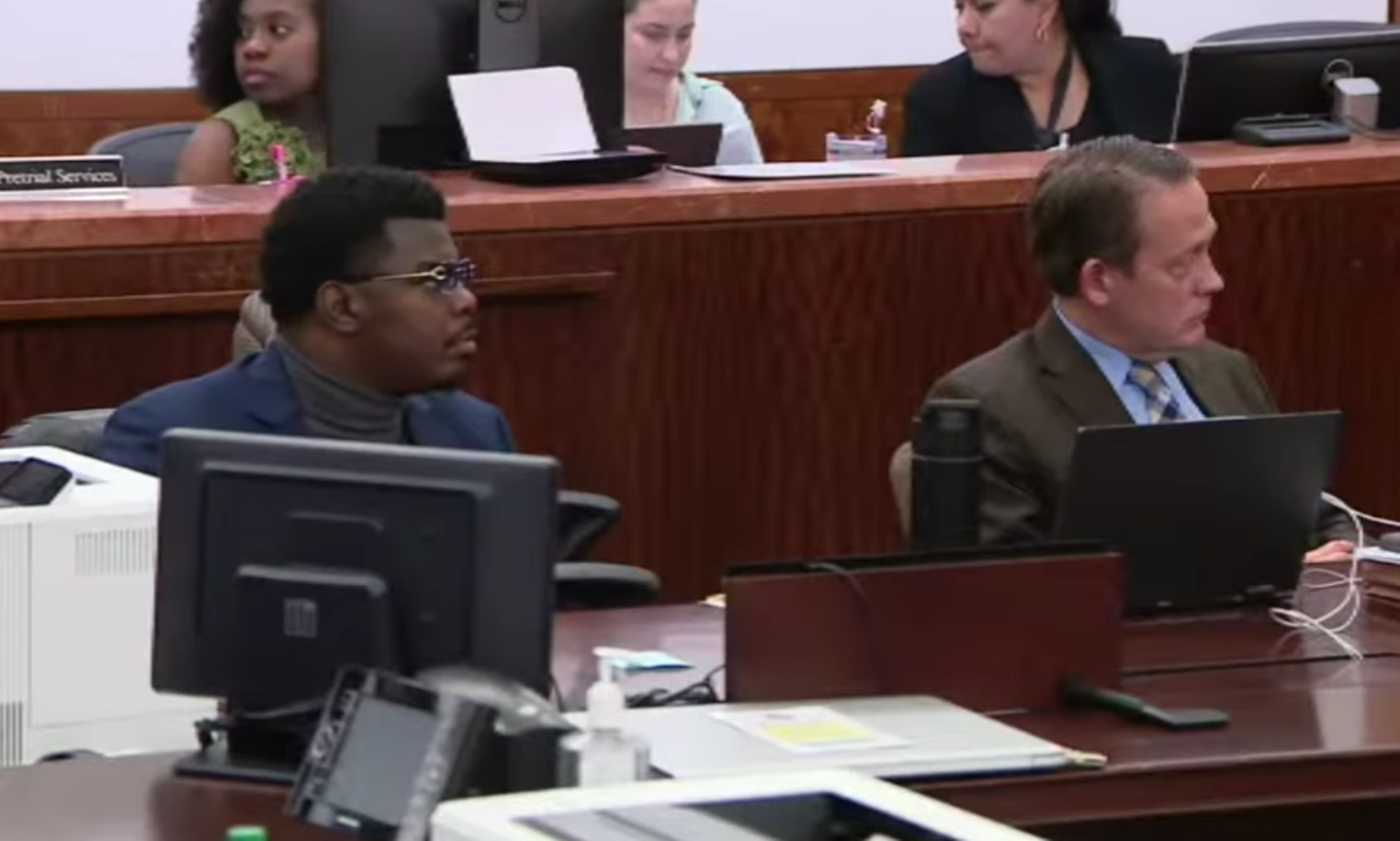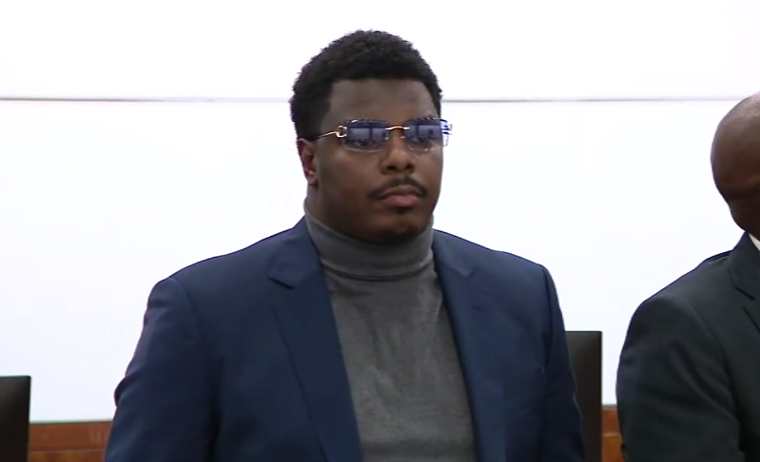The mother of 26-year-old Tavores Henderson concedes that her son was involved in a tragic accident that resulted in the 2019 death of a Nassau Bay police sergeant. The family is concerned, however, about what they say are systemic failures that led to Henderson’s release from a Houston hospital the very day that the accident occurred.
Tavores Henderson, who was diagnosed at a young age with schizophrenia, was convicted September 4 of aggravated assault on a public servant. Prosecutors said Henderson, who was 19 at the time, ran over Sgt. Kaila Sullivan with his vehicle while fleeing a traffic stop. He was originally charged with capital murder, but a jury opted to go with the lesser offense.
District Judge Melissa Morris sentenced Henderson on September 10 to 58 years in prison. Henderson’s criminal defense attorney, David Rushing, asked for 10 years; prosecutors sought a life sentence.
A jury heard testimony from the prosecution for two full days last week, with Rushing calling no witnesses, before handing down the verdict. The punishment range for aggravated assault on a public servant is five years to life in prison.
“During guilt and innocence, our whole strategy was just to attack the ‘mental state’ requirement that he did it intentionally and knowingly,” Rushing said when asked why he didn’t call witnesses for the first part of the trial. “Aside from Tavores himself, there was really nobody to testify to that. There were strategic reasons why we didn’t want to call Mr. Henderson during guilt and innocence.”
Tavores Henderson, 26, was sentenced this week to 58 years in prison.
Screenshot
Prosecutors said Officer Clint Brown pulled over Henderson for running a stop sign in the Nassau Bay community near Johnson Space Center. Henderson allegedly argued with the officer while on speakerphone with his mother. Officer Brown determined that Henderson had a warrant for a misdemeanor domestic violence charge and attempted to detain him.
According to court documents, Henderson freed himself from Brown and got back in his Jeep Wrangler with a handcuff attached to one of his wrists. Sullivan, who was on patrol with Brown, allegedly attempted to climb into Henderson’s vehicle, and the driver sped off. Sgt. Sullivan fell from the open passenger door and was run over, witnesses testified in court. She later died in a hospital.
Rushing said the officer’s death was an “awful tragedy,” and Henderson likely didn’t know she was dead when he ditched the vehicle later. It’s what happened prior to the accident that keeps Henderson’s mother Tiffany Henderson up at night, said a family friend who asked that her name not be used.
Tiffany Henderson did not respond to multiple requests for an interview but testified during the punishment phase of her son’s trial. She said Tavores, an aspiring rapper who had performed with Soulja Boy, suffered from schizophrenia since he was 8 years old. Diagnostic paperwork from the Harris County Jail shows that Tavores Henderson had schizoaffective disorder and “intermittent explosive disorder.”
Tavores Henderson was in a mental health crisis on December 10, 2019, his family members said in court. His mother says he was released from the hospital on a psychiatric hold against her pleas to let him stay in the care of professionals. A doctor prescribed “inpatient meds,” according to the family friend, and a pharmacist allegedly refused to give Tiffany Henderson the medication, telling her it could not be administered at home.
“[Tavores] ends up getting in the car at some point, paranoid,” the family friend said. “The police get behind him and he tries to flee the police. The officer tries to jump in the car and she gets run over. It’s a terrible tragedy, but it’s a competency issue and this could all have been prevented if he’d been able to get the care he needed that day.”
Tiffany Henderson was charged shortly after the December 2019 accident for hiding her son in a motel room while officers were looking for him. Tavores Henderson was arrested after a two-day manhunt and has been held in the Harris County Jail since then.
Rushing confirmed that to his knowledge, Henderson was released from the hospital and denied medication, because it was considered a controlled substance, on the day of the accident. The attorney added that he does not believe “a thought crossed his mind” that he would harm someone that day.
“When he left, I think he was just trying to get out of there,” Rushing said.
Texas Jail Project cofounder and executive director Krish Gundu said the situation of a mentally ill person being confined to incarceration rather than getting treatment isn’t unique.
“Whose fault is this? This is not an outlier; this is not a unicorn,” Gundu said in a July interview with the Houston Press, as she detailed Henderson’s situation and other cases of people in mental health crises who have been jailed instead of hospitalized.
Harris County has faced scrutiny for years for incarcerating individuals who advocates say would be better served through mental health treatment. As of Thursday morning, there were about 7,275 inmates at the Harris County Jail and more than 1,420 outsourced to lockups in other states.
About 78 percent of the current jail population has a “mental health indicator,” which can signify a history of mental health problems or experiences of serious psychological distress in the 30 days prior to intake. About 26 percent of the jail population is on psychotropic medication, according to the sheriff’s office dashboard.
Aquittals based on insanity are uncommon but not impossible. Melissa Towne, a schizophrenic woman from Tomball who admitted to stabbing and suffocating her 5-year-old daughter in 2022, was found not guilty by reason of insanity earlier this week.
Rushing said a competency exam was administered in Henderson’s case and the young man was found fit to stand trial. The attorney said he had hoped for a better outcome but was grateful that the jury agreed to a lesser charge.
“It’s still a better result than it could have been but I was disappointed by the length of time,” he said. “I think there’s a lot of political pressure on [the prosecution because a police officer was involved]. At the end of the day, they charged what they thought they could prove, and I think they miscalculated. I would have preferred manslaughter, but aggravated assault, the mental state required is recklessness, and so I can see where a jury could come to that.”
Henderson has a criminal history and current charges, including possession of a prohibited substance in a correctional facility and aggravated sexual assault, but his attorney said he has no convictions as an adult. His mental state during the trial appeared to be stable, Rushing said.
“In terms of his mental health, he seems to be doing a little bit better these days,” Rushing said. “He’s been prescribed medication. I can’t personally tell you if he’s actually taking it or not.”
As to whether the diagnosis of schizophrenia implies that Henderson is prone to violence, Rushing said he can’t speculate. “I’m not a mental health expert, but the testimony from trial sounded like when he was having some episodes, he would punch walls but there was never any violence toward individuals.”
At least three Harris County Jail officers testified this week that Hendreson made verbal threats against them and their families but never physically assaulted them while incarcerated.
“The state did a very good job of proving those up as extraneous offenses, and that absolutely worked against him,” Rushing said.
Rushing’s law firm filed a notice of appeal on Wednesday and the lawyer said he expects he will not be involved in the case going forward. Although Rushing has defended several murder defendants and traditionally practiced criminal law, he’s transitioning toward personal injury cases, he said.
“At the end of the day, I wouldn’t have done anything different, because, at the end of the day, he was not guilty of capital murder, which would have guaranteed dying in prison. Now he’s got a very good chance at parole at some point in his life.”
Because the offense is aggravated, Henderson will not be considered for parole until he’s served half his time, or about 29 years. He’s already got credit for the six years he spent in the Harris County Jail, Rushing said.
“[The Texas Department of Criminal Justice] is a dangerous place,” the lawyer said when asked whether he’s concerned for Henderson’s safety while he’s in prison. “There are a lot of unstable and socially difficult people there. That’s why they’re there. But lots of people do very long sentences and come out of there OK. There’s no telling.”
Rushing echoed a statement that’s been said by almost everyone involved in the case: It never should have happened.
“At the end of the day, there was no intention to kill Officer Sullivan,” he said. “It was a horrific accident. I am confident that if Tavores Henderson could go back in time, he would have done things very differently because he had no intention of doing that.”

